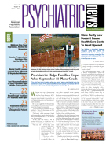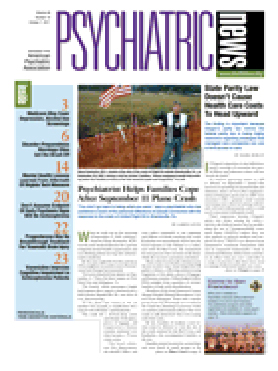Approximately half of all patients experiencing a first episode of psychosis present for treatment with a concurrent substance use disorder. And half of those will become abstinent or significantly reduce their alcohol and/or drug use after that first episode, whether or not they receive specialized substance abuse treatment.
That was the finding of a group of researchers at the New York State Psychiatric Institute and at Dartmouth University, reported in the September Psychiatric Services. Their study consisted of an extensive review of the literature on changes in substance use after treatment for psychosis among individuals who did and did not receive specialized substance abuse treatment.
"Little is known about the course and treatment of co-occurring substance use disorders among clients with first-episode psychosis," wrote Jennifer Wisdom, Ph.D., M.P.H., an associate professor of clinical psychology and a research scientist at the New York State Psychiatric Institute, and colleagues. "These issues are much better understood among clients with long-term psychotic disorders."
The researchers divided treatment studies into two categories: those that provided basic interventions for psychosis, including education regarding the need to avoid psychoactive substances of abuse to prevent psychosis relapses, and those that provided some type of specialized substance abuse treatment.
The researchers identified five studies that included specialized substance abuse treatment and nine that did not, all of which assessed the course of substance abuse after a first episode of psychosis. They then organized the studies by design (randomized, controlled trial, prospective cohort, retrospective cohort, case control, and observations) but were unable to aggregate data statistically due to the heterogeneity in designs, methods, and measures.
"Approximately half of the clients in these studies became abstinent or significantly reduced their use of substances, primarily cannabis and alcohol in all studies," they noted. "The reductions in use tended to occur rapidly and to be stable. Another consistent finding was that clients who adopted abstinence reduced their rates of relapse and hospitalization, whereas those with persistent substance use disorders experienced increased rates of relapse and hospitalization."
In an editorial in the same issue, Melanie Bennett, Ph.D., and Lisa Dixon, M.D., M.P.H., both of the Department of Psychiatry at the University of Maryland School of Medicine, pointed out that the work of Wisdom and her colleagues highlights how little is known about substance use and first-episode psychosis, including the long-term implications of abstinence related to that episode. "Would a person who abstains from substance use and who experiences another episode of psychosis reconsider his or her substance-using behavior?" they asked.
Jeffrey Lieberman, M.D., a professor and chair of the Department of Psychiatry at Columbia University College of Physicians and Surgeons, reviewed the study and commented for Psychiatric News. "What is interesting is that specialized therapy for drug and alcohol misuse did not seem to make a difference for this population," he said. "That suggests that perhaps our current therapies don't work for a dual-diagnosis population such as this one. It's also possible that the researchers were only able to draw limited conclusions due to the fairly small number of subjects studied and low statistical power that addressed this issue."
Wisdom and her colleagues appear to agree. "Experience, education, treatment, or other factors led many clients to curtail their substance use disorders after a first episode of psychosis," they said. "Specialized interventions for others need to be developed and tested."
The study was funded by a grant from the National Institute on Drug Abuse to Wisdom.


